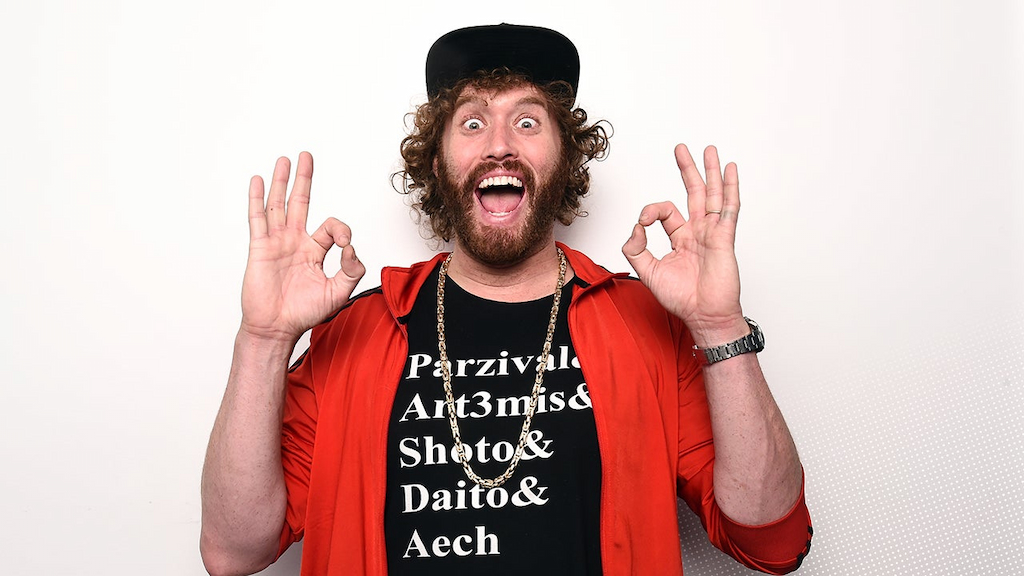The 36-year-old comedian is going deep into his love of comedy, returning to his stand-up roots and waxing poetic about his new sketch podcast, 'Heavyweight.'
T.J. Miller’s career is driven by one mission statement: “Life is a pretty tragic endeavor, so you want to make as many people laugh as possible, and to do that, you've got to do it on all levels.” Sure, it’s pretty altruistic, he admits to ET, but it’s been working handsomely to guide his career forward.
As the breakout star of HBO’s Silicon Valley, on which he played bad-boy entrepreneur Erlich Bachman for four seasons, the 36-year-old actor and comedian has seen his profile rise with sidekick roles alongside Mark Wahlberg and Ryan Reynolds in Transformers: Age of Extinction and Deadpool, respectively. He closed out 2016 with the ensemble Office Christmas Party and voiced Gene in this year’s Emoji Movie. This fall, he was back on the road in Canada with Nick Vatterott and Rhys Darby as part of the Just for Laughs Alternative Comedy Tour.
But for all that he has going on, Miller knows audiences aren’t going to see him in everything he does. “Some people are going to watch Silicon Valley, but a lot aren't. They're going to see Transformers 4, and then some people that would never see Transformers 4, they end up listening to the podcast and really get into that,” he says of the ambition that keeps his brain moving at breakneck speed. “[I’m] driven by this idea of how can we reach even more people? That's what it always is.”
It’s a self-less philosophy that doesn’t allow Miller to sit around. “The way I relax and unwind is by working, because instead of needing escapism, my escape is creating more escapism,” he says.
To that point, after his surprise departure from Silicon Valley, he packed 2017 with filming the Kristen Stewart thriller, Underwater, reprising his role as Weasel in Deadpool 2 -- which he says “is going to be so much funnier than the original” -- and the tour through Canada. Then in November, he launched Heavyweight, a new monthly sketch podcast on Laughly that grew from his four-person sketch team of the same name.
Born out of the Chicago comedy scene, Miller, Vatterott, Brady Novak and Mark Raterman have been performing together as Heavyweight since 2004. Their transition into a podcast -- a medium Miller has a firm hold on with his cult series, Cashing In With T.J. Miller as well as numerous guest spots on his peers' and friends' shows -- was a surprisingly natural progression, stemming from a hole Miller saw in the sketch comedy world.
"People go to see live sketch, but it's not really a thing that's that popular, besides Comedy Bang Bang," Miller explains. "Think about how much we love sketch comedy: UCB, Saturday Night Live... I don't love Saturday Night Live, but there are great sketches. Melissa McCarthy killed it. They definitely have their moments. So, great sketch can be unparalleled in comedy. There's something about it.”
Influenced by Kids in the Hall and The State, these “heavyweights” are more absurdist than they are SNL. “I like to say we're the Cirque du Soleil of Kenny Rogers' chicken restaurants,” he says, explaining that the podcast is a “literal smorgasbord,” with an ever-shifting format of segments. “Sometimes the sketches will be little thoughts that are 10 seconds long, or there might be an episode that's just a murder mystery parodying audio podcasts that go to back in the day with the radio play.”
While translating their brand of comedy to an audio-only format hasn’t been without its challenges, the biggest, perhaps, is also exactly what's at heart of the show: standing out against a staggering number of podcasts, no matter the genre. Sure, they would like to invite "dream-come-true" guests like Paul F. Tompkins or Tig Notaro to join them, but guest stars aren’t a necessary component of Heavyweight. In fact, the group’s main drive is to keep doing what they've been doing, which is basically being bonkers.
"We just want the show to be successful, and we want Laughly to be successful,” Miller says, pointing to the recent collapse of NBCUniversal’s subscription comedy streaming service, Seeso, and social media apps like Vine. “I sort of gleefully giggled at the idea that these Vine stars had become so entitled and had huge fan clubs and all that stuff. They were so self-assured about their fame, because a lot of it was how many followers can I get, and the platform just shut down. It was crazy. They went from being stars making six figures for endorsing stuff to not having a place where people were going to go."
Despite Miller’s rising stature in Hollywood, he clarifies that the podcast is not "T.J. Miller's Heavyweight Sketch Comedy Show." “The truth is, I'm the least comfortable with that,” he admits. “It's just awkward and weird. It is this group that's been together for over a decade doing sketch comedy, and doing sketch comedy that's pretty out there.
“Here's the thing about sketch: unlike pretty much everything else that I do, you have a group mentality, like an improv group or a band. Luckily, we work really well together," he adds of his Heavyweight pals. "Nick and I were talking about it -- instead of minimizing it, let's take advantage of [my success] and be fine with it, because they know I'm not like, 'I'm the star!' They were happy for my success, and each of them has been very successful in their own rights and in different ways."
Part of what is keeping Miller on this successful path is physically leaving Hollywood, which he was able to do after stepping away from Silicon Valley. The Colorado native and his wife, Kate Miller, moved to New York City earlier this year, and the change has been a blessing for them both. The two have known each other since college, and their dream has always been to live in Manhattan together, so putting down roots in the Big Apple has been “really f**king awesome,” as it allows Miller to fully support Kate in her artistic journey.
“Getting to be around her and watch her grow and become the artist that she is, I don't want to miss out on that because I'm collecting a paycheck,” he says. “She always wanted to be an artist in New York City, and I always wanted to be doing standup comedy in New York City -- that's what we wanted to do. And now that it's possible, I was like, 'Let's just go for it. Let's do it. Let's put that before everything else.’”
The move to the East Coast was also a response to “this nightmarish situation we've found ourselves in,” Miller says, turning back to his roots in standup comedy as a way to reach people -- and make them laugh. “After the election, I was like, ‘Dear lord, I better figure out how I can pitch in, because the progressives are going to war.’ It was a little bit of that. I quickly have found out that in a very positive way, what people need more than any of my political stances right now is just to laugh, and they welcome that escapism that I am sort of driven to create.”
But the nightmare hasn’t been limited to the country’s post-election reality. In recent months, Hollywood has been forced to deal with many allegations of sexual misconduct. Though Miller didn’t speak about any of the accused men specifically, he did point out that that the dizzying number of accusations is part of a larger societal problem.
“It really is this thing like, ‘What horrible thing do you want to talk about? What’s next?’" he says, referring to a cycle of negative news from the current political climate to continued gun violence. "Unfortunately, wait until tomorrow for even worse things to happen. It really is, unfortunately, this time that's so dark and so many horrible things are happening and coming to prominence and coming to the forefront of conversations.”
In fact, if he had any control over it, he would focus the conversation fully on comedy, though he knows change is necessary. “There needs to be a shift in culture, and that's obviously a response to a lot of this stuff and a response to the administration in a big way," Miller concedes. "That's what's so horrible. It's good [that abuses are coming to light] but it's also dampening everybody's spirit because it's just, like, more and more horribleness.”



